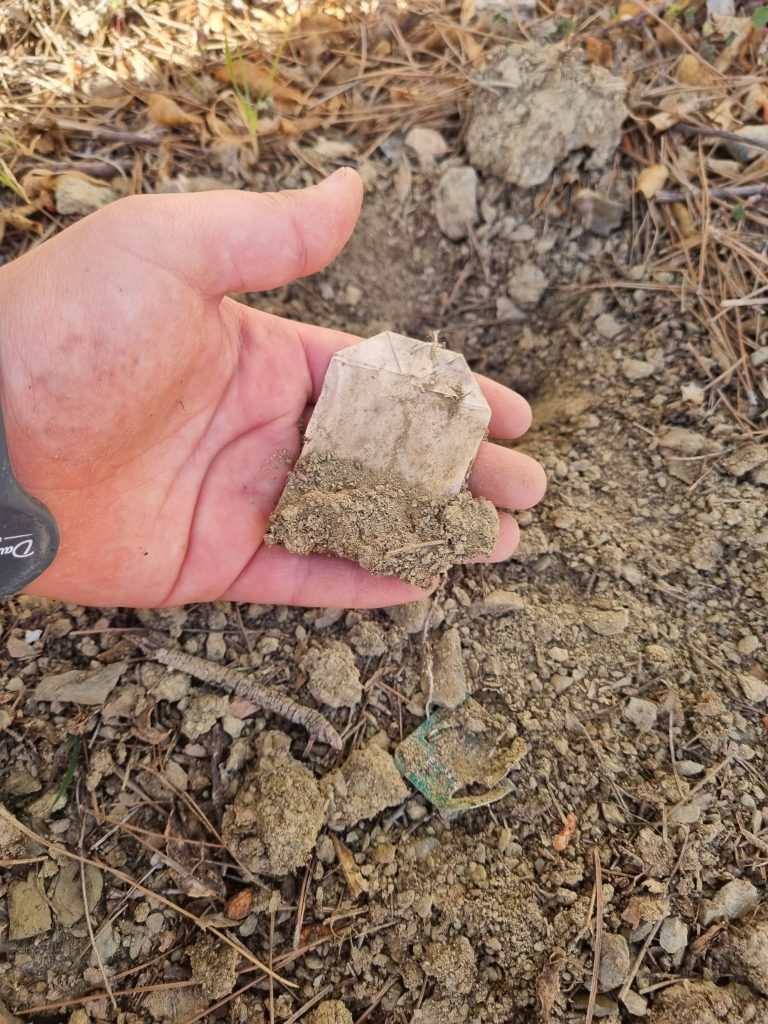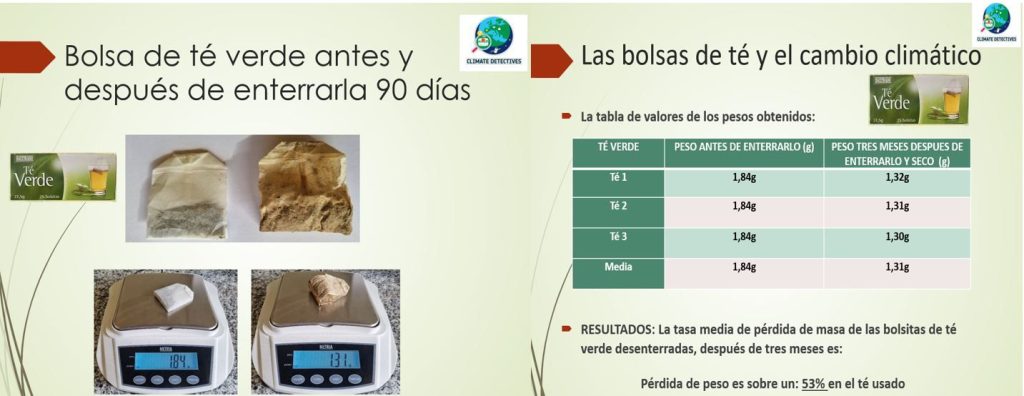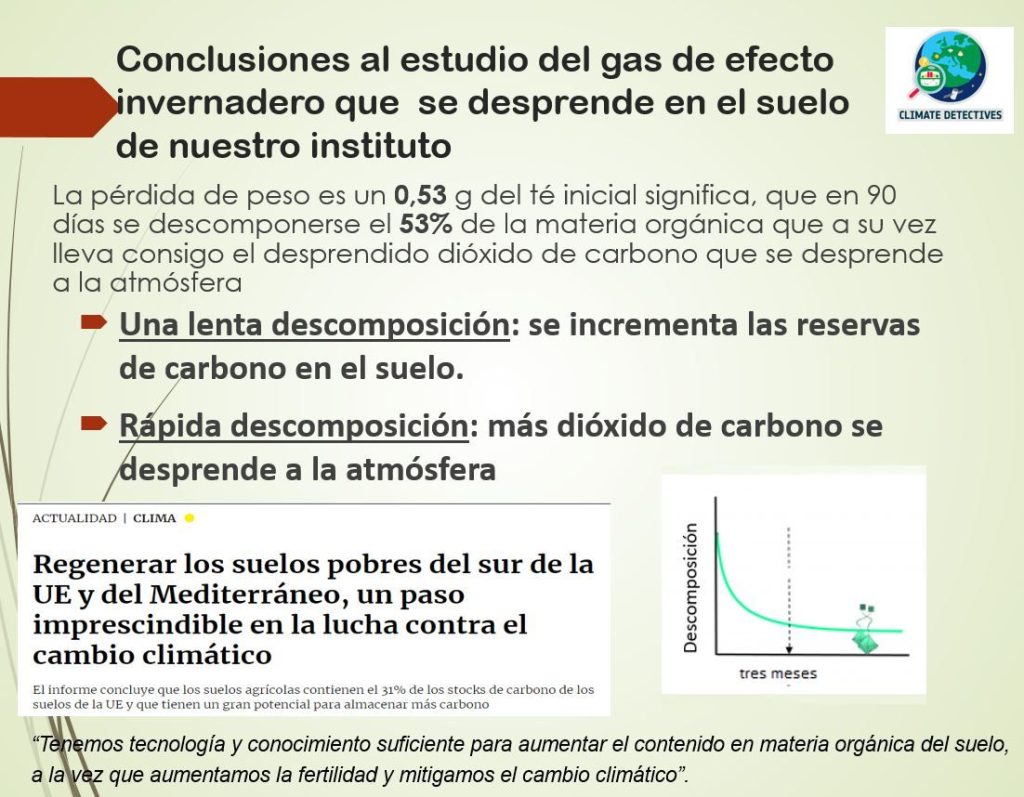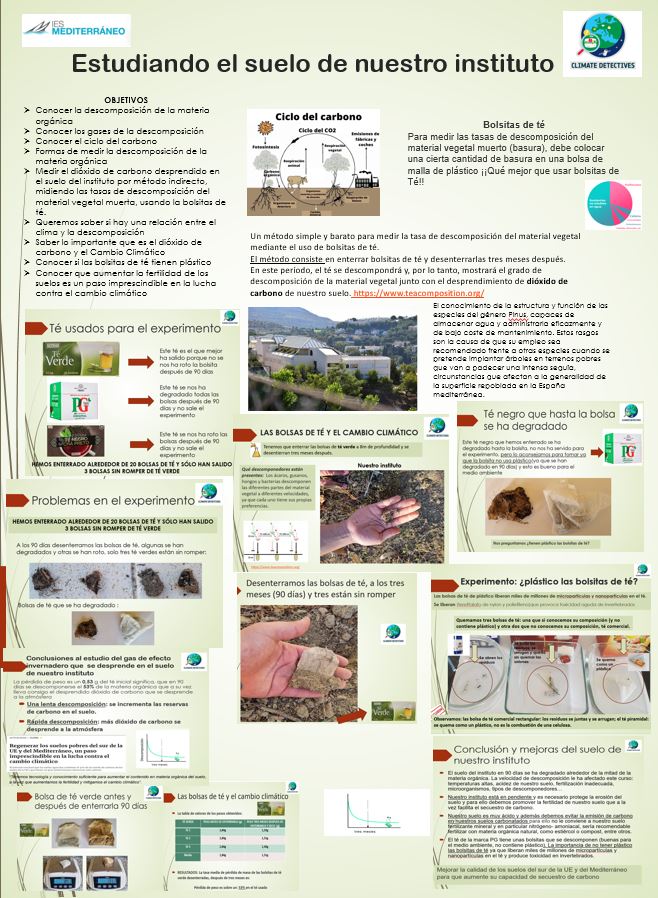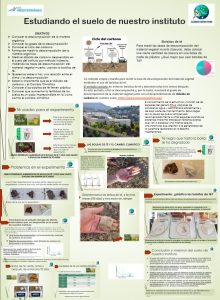Climate Detectives Projects 2022-2023
Project title: Studying the soil of our school
Team: Mediterráneo
IES Mediterráneo Malaga España 6 Student’s age: 12-13 years old
How much organic matter does the soil in our institute degrade?
¿Cuánta materia orgánica degrada el suelo de nuestro instituto?
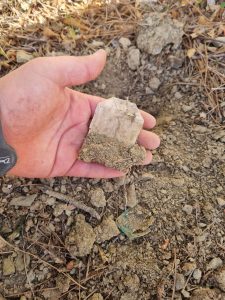
Our institute has 30 pine trees around it and we want to measure the carbon dioxide released in the soil of the institute by indirect method, measuring the decomposition rates of dead plant material, using the tea bags. Linking carbon dioxide and Climate Change. Soils containing 30% carbon have great potential to store carbon, the need to increase soil fertility is an essential step in the fight against climate change. We have the technology and knowledge to increase the organic matter content of the soil, while increasing fertility and mitigating climate change.
Nuestro instituto tiene 30 pinos a su alrededor y queremos medir el dióxido de carbono desprendido en el suelo del instituto por método indirecto, midiendo las tasas de descomposición del material vegetal muerta, usando la bolsitas de té. Relacionar el dióxido de carbono y el Cambio Climático. Los suelos que contienen un porcentaje de carbono de un 30% tiene gran potencial para almacenar carbono, la necesidad de aumentar la fertilidad de los suelos es un paso imprescindible en la lucha contra el cambio climático. Tenemos la tecnología y conocimiento suficiente para aumentar el contenido en materia orgánica del suelo, a la vez que aumentamos la fertilidad y mitigamos el cambio climático.
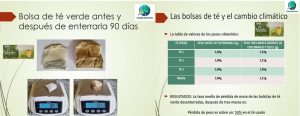
-The soil in the school has degraded about half of its organic matter in 90 days. The speed of decomposition has affected this course: high temperatures, acidity of our soil, inadequate fertilisation, micro-organisms, types of decomposers….
-Our institute is on a slope and it is necessary to protect soil erosion and to do this we must promote the fertility of our soil which in turn facilitates carbon sequestration.
-Our soil is very acidic and we must avoid the emission of carbon in our carbonated soils. For this reason, it is not suitable for our soil mineral fertilizer and in particular nitrogen-ammonia, it would be advisable to fertilize with natural organic matter, such as manure or compost, among others.
-The PG brand tea has a decomposable tea bag (good for the environment, it does not contain plastic). The importance of not having plastic in the tea bags is that they release billions of micro and nanoparticles in the tea and produce toxicity in invertebrates.
-El suelo del instituto en 90 días se ha degradado alrededor de la mitad de la materia orgánica. La velocidad de descomposición le ha afectado este curso: temperaturas altas, acidez de nuestro suelo, fertilización inadecuada, microorganismos, tipos de descomponedores…
-Nuestro instituto está en pendiente y es necesario protege la erosión del suelo y para ello debemos promover la fertilidad de nuestro suelo que a la vez facilita el secuestro de carbono.
-Nuestro suelo es muy ácido y además debemos evitar la emisión de carbono en nuestros suelos carbonatados para ello no le conviene a nuestro suelo fertilizante mineral y en particular nitrógeno- amoniacal, sería recomendable fertilizar con materia orgánica natural, como estiércol o compost, entre otros.
-El té de la marca PG tiene unas bolsitas que se descomponen (buenas para el medio ambiente, no contiene plástico). La importancia de no tener plástico las bolsitas de té ya que liberan miles de millones de micropartículas y nanopartículas en el té y produce toxicidad en invertebrados.
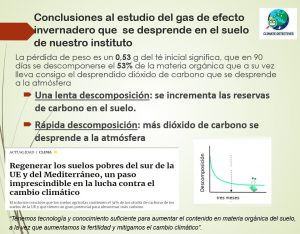
-Our soil is very acidic and we have to avoid carbon emission in our carbonate soils, therefore it is not suitable for our soil to be fertilised with mineral fertilisers and in particular with nitrogen-ammonia, it would be advisable to fertilise with natural organic matter, such as manure or compost, among others.
– The soil of the institute in 90 days has degraded about half of the organic matter. The speed of decomposition has been affected this year: high temperatures, acidity of our soil, inadequate fertilisation, micro-organisms, types of decomposers…
-Our institute is on a slope and it is necessary to protect the soil erosion and for this we must promote the fertility of our soil which at the same time facilitates carbon sequestration.
-PG brand tea has tea bags that decompose (good for the environment, no plastic). The importance of not having plastic in the tea bags is that it releases billions of micro and nanoparticles in the tea and produces toxicity in invertebrates.
-Nuestro suelo es muy ácido y además debemos evitar la emisión de carbono en nuestros suelos carbonatados para ello no le conviene a nuestro suelo fertilizante mineral y en particular nitrógeno- amoniacal, sería recomendable fertilizar con materia orgánica natural, como estiércol o compost, entre otros.
– El suelo del instituto en 90 días se ha degradado alrededor de la mitad de la materia orgánica. La velocidad de descomposición le ha afectado este curso: temperaturas altas, acidez de nuestro suelo, fertilización inadecuada, microorganismos, tipos de descomponedores…
-Nuestro instituto está en pendiente y es necesario protege la erosión del suelo y para ello debemos promover la fertilidad de nuestro suelo que a la vez facilita el secuestro de carbono.
-El té de la marca PG tiene unas bolsitas que se descomponen (buenas para el medio ambiente, no contiene plástico). La importancia de no tener plástico las bolsitas de té ya que liberan miles de millones de micropartículas y nanopartículas en el té y produce toxicidad en invertebrados.
https://drive.google.com/file/d/12Cu16FAFR-EOhcnSRTJOk0K5qeFsRIF6/view?usp=sharing
This project was automatically translated into English.
Projects are created by the teams and they take the full responsibility of the shared data.
← All projects


